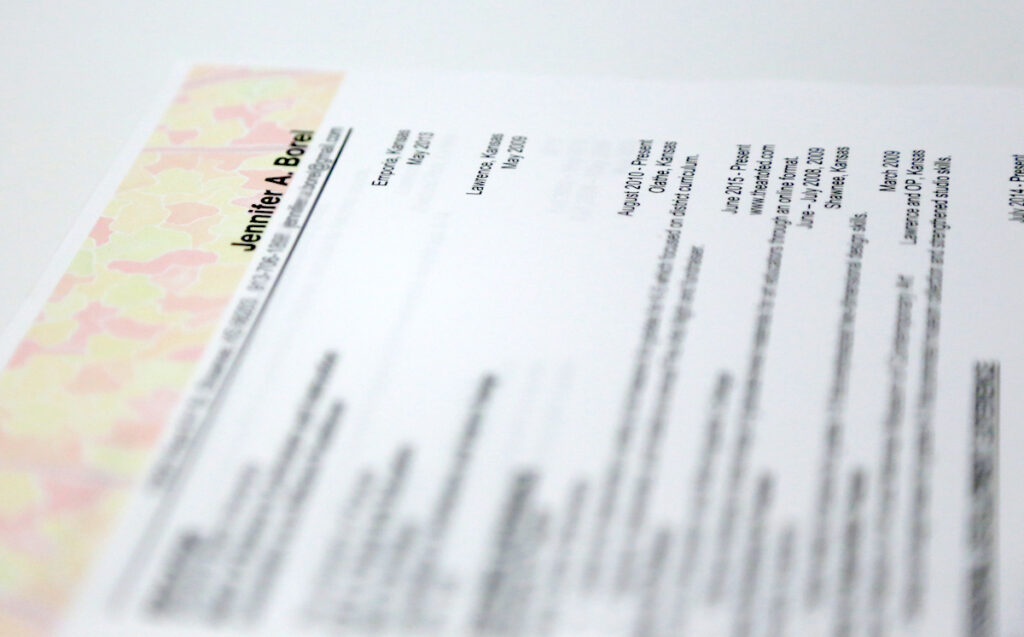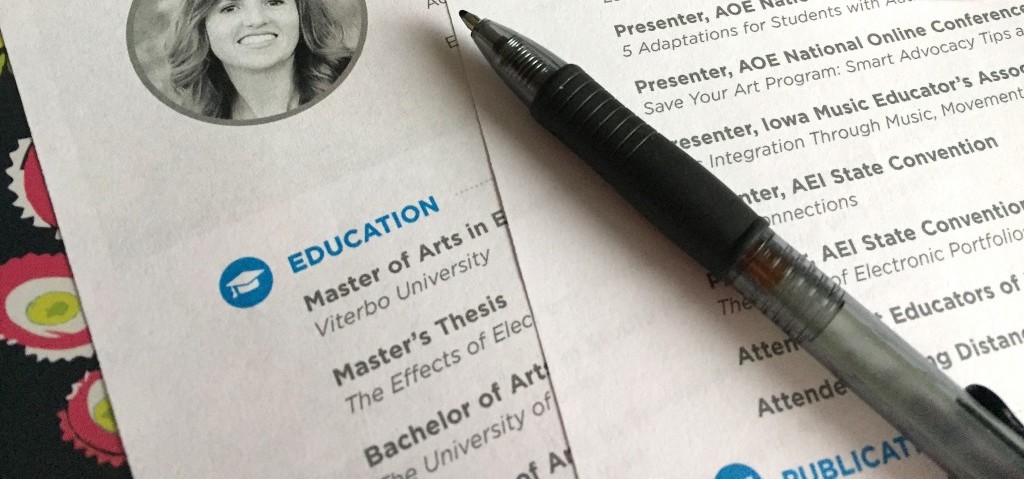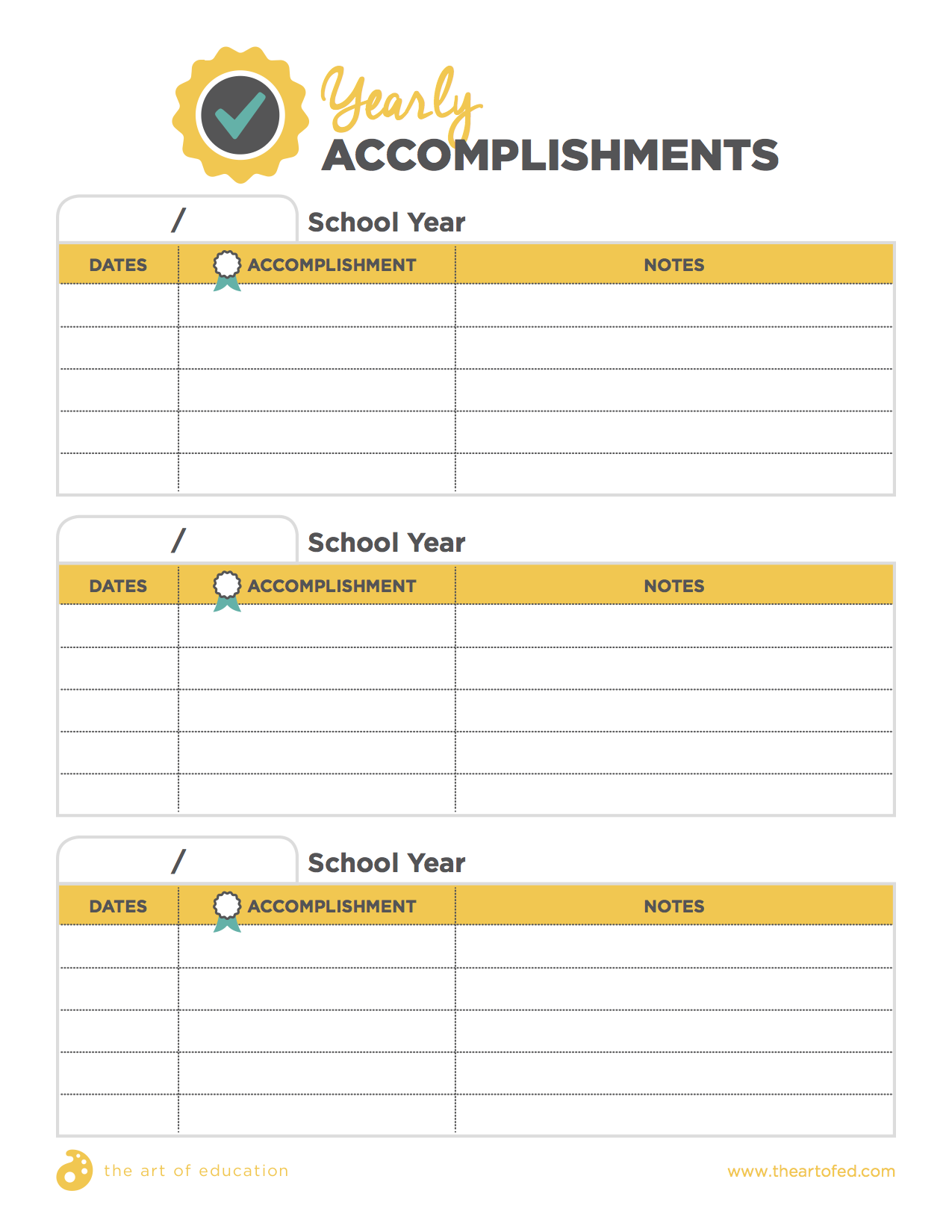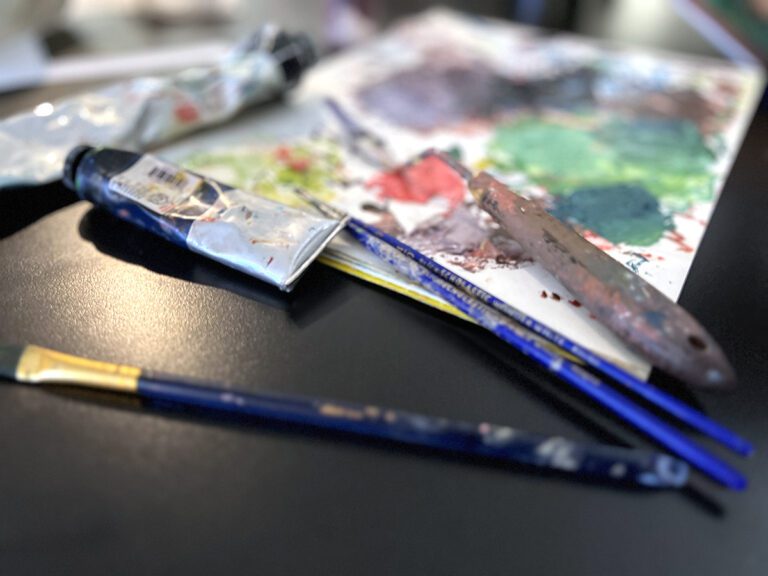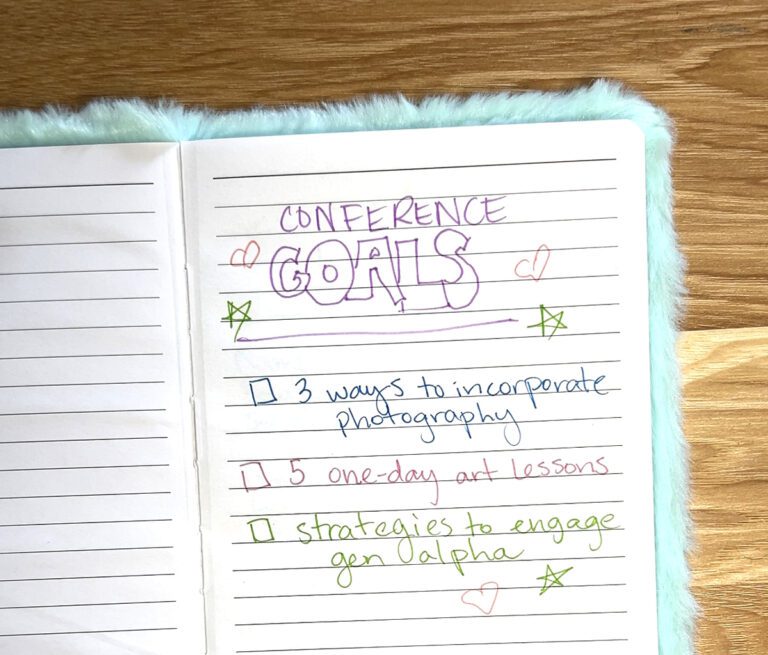Applying for a job is stressful. There’s just so much that’s out of your control. A interviewer may be looking for an extremely specific set of skills. A school may go with someone else based on a gut feeling. Or, worst of all, schools may legally have to hold interviews for positions that have essentially already been filled. What’s an art teacher to do?
My advice is to focus on what is in your control. One of those things is your resume or curriculum vitae. But, how do you know which to choose and what to include? Today we’ll explore the difference between the two, why you would choose one over the other as well as specific tips for each.
3 Key Differences Between a Resume and a Curriculum Vitae
Both a resume and a curriculum vitae are used to summarize your skills and experience in order to communicate why you are qualified for a job. However, they do differ in three key ways.
Length and Purpose
Two of the main differences between a resume and a curriculum vitae are how long they are and what purpose they serve. In general, a resume is a one page document that highlights your educational and professional accomplishments. In contrast, a curriculum vitae, or CV, generally stretches to two or three pages. It is a comprehensive look at your academic and professional history. It includes any presentations you’ve given, publications you’ve been selected for, and other specific achievements.
Organization
Another way resumes and CVs are different is the way they are organized. A resume’s format and organization system can change depending on the position you’re applying for and what you want to highlight.
In contrast, sections on a curriculum vitae are always organized in reverse chronological order. And, although you may change the order of the sections depending on the position for which you’re applying, the CV will remain comprehensive.
In short, as Jörgen Sundberg writes at The Undercover Recruiter, “I would say the main difference between a resume and a CV is that a CV is intended to be a full record of your career history and a resume is a brief, targeted list of skills and achievements.”
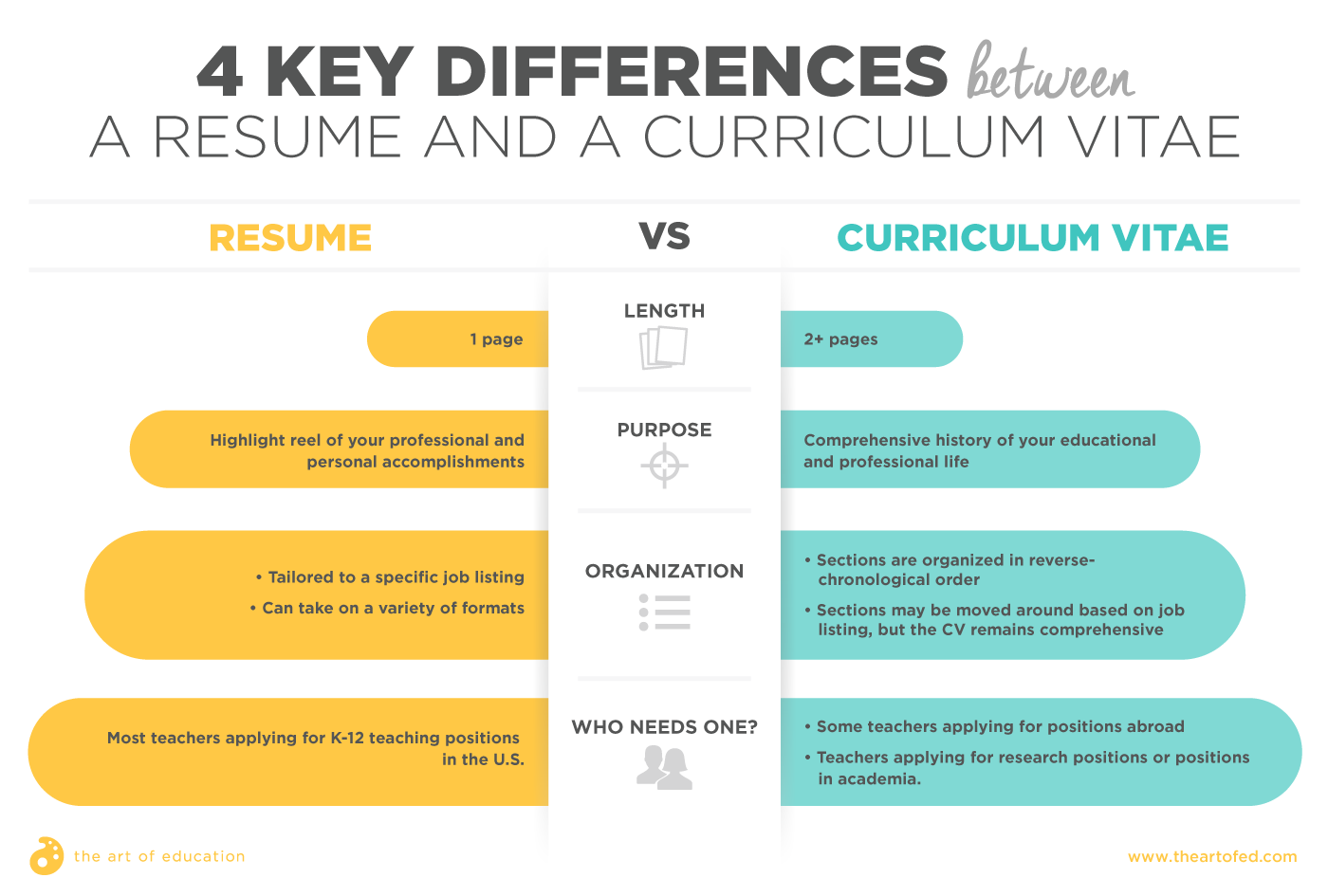
When to Choose a Curriculum Vitae Over a Resume
Most of us are used to submitting a resume for job postings. However, make sure you read the listing carefully, just in case. The good news is there generally is no ambiguity. The HR department will specifically ask for one over the other.
Here are some situations that may require a curriculum vitae instead of a resume.
Positions in Certain Parts of the World
If you are applying for a job in the US, most often you will be asked for a resume.
However, these parts of the world generally ask for a CV or leave it to your discretion:
- The United Kingdom
- Ireland
- New Zealand
- Australia
- India
- South Africa
- Various Other European Countries
You can find a downloadable European Union CV template right here.
So if you’re looking to teach abroad, you will likely want to have a CV ready to go! However, as Stacey Lastoe points out on The Muse, “…if you’re truly dumbfounded about what’s needed, it’s OK to ask the point of contact directly, ‘Would you prefer a resume or CV?’”
Positions in Certain Fields
In addition, you are more likely to be asked for a CV in the United States or anywhere else for positions that relate to academia or research.
However, even if you never plan to apply abroad, become a professor or work in research, creating and maintaining a curriculum vitae is a great idea. As Stacey goes onto say, “Not only can you have it handy if you do ever need it, but you’ll also have a running list of everything you’ve ever accomplished.” In this way, she describes, it becomes like a master resume from which you can pick and choose things to include on resumes for various other positions.
Now that we’ve looked at the differences between the two and when you might be asked for each, let’s talk about some specific tips.
Specific Tips for Crafting a Resume and a Curriculum Vitae
5 Specific Tips for Crafting Your Resume
These tips first appeared in the article “The Art Teacher’s Ultimate Guide to Getting Hired.” If you’re still searching for the perfect position, it’s a must-read.
- Use a pop of color.
Resumes have gotten wildly creative in the last few years. Strike a balance. A simple clean design with a pop of color is a good way to go. - Keep it short and sweet.
Keep your resume to one or two pages. Administrators will not have time to read through tons of information. - Double check spelling and grammar.
Don’t let a simple error be the reason someone jumps ahead of you. Have at least two other people you trust proofread your work.

- Include what you’ve done for students.
Instead of just listing your teaching experience, include specific, quantifiable highlights. It might look something like this:
2012-2015: 123ABC Elementary School
– Collaborated with grade level teachers to plan 20+ cross-curricular projects
– Set up two art shows in the wider community each year
– Ran an after school makerspace program twice monthly for fifth-grade students - Show you are a lifelong learner.
Even if you don’t have a master’s degree, show that you’re committed to continuing education. Mention any courses, workshops, conferences, or other PD in which you’ve participated.
3 Specific Tips for Crafting Your Curriculum Vitae
Many of the resume tips above also apply to a curriculum vitae. However, here are three more things to think about as you craft your CV.
- Find an Example from the Field Your Applying To
While the format for a curriculum vitae is somewhat standard, each field may have their own personal preferences. As the Purdue Online Writing Lab states, “There are different emphases in each discipline, and a good CV is one that emphasizes the points that are considered to be most important in your discipline and conforms to standard conventions within your discipline.” It goes on to say, “A good place to start is to find as many examples as possible of CVs by people in your discipline who have recently been on the job market.” A quick Google Search should point you in the right direction. In addition, don’t be afraid to reach out to friends and colleagues to see if you could take a peek at their CV.

- Use a Simple, Clear Design
In general, art teachers love colors and prints. However, a curriculum vitae is not the place to show off. Like a resume, you want to keep things simple and streamlined. This idea is even more important here because you will be including a greater amount of information. Make sure your design is streamlined so people can read it easily. - Keep it Updated
This idea works for both a resume and a curriculum vitae. However, if you keep your CV updated, you’ll easily be able to pull accomplishments from it to craft any resume. Consider downloading the sheet below to keep track of your accomplishments each year. That way, when it comes time to update, you’ll have everything at your fingertips.
Although you can’t control what an interview committee is looking for, you can make sure you bring your A game in terms of a resume or CV. Keep a running list of your accomplishments to make it easy to update your documents at a moment’s notice. You never know when the next exciting opportunity will come your way!
Have you ever had to apply using a curriculum vitae? What tips do you have for crafting one?
What do you think are the most important things to include on documents like these?
Magazine articles and podcasts are opinions of professional education contributors and do not necessarily represent the position of the Art of Education University (AOEU) or its academic offerings. Contributors use terms in the way they are most often talked about in the scope of their educational experiences.

